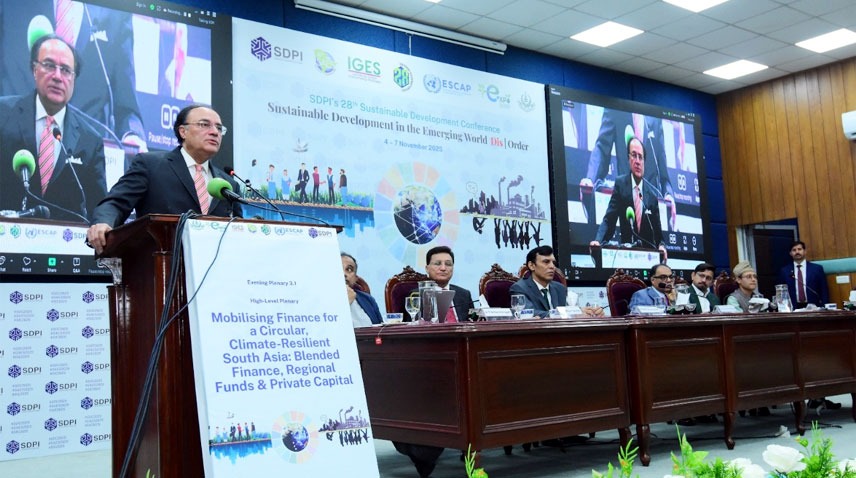Minister for Finance Muhammad Aurangzeb reaffirmed the government’s commitment to prioritise climate change and population management within Pakistan’s economic and fiscal planning while addressing delegates at the 28th Sustainable Development Conference organised by the Sustainable Development Policy Institute in Islamabad.
He noted that despite global uncertainty the world economy has shown notable resilience, but warned that countries like Pakistan must build strong fiscal and external buffers to withstand potential external shocks amid rising protectionism and supply chain realignments. The minister stressed that strengthening these buffers is essential to support sustained climate finance and long-term development goals.
On digital assets, he highlighted recent steps including the creation of the Pakistan Crypto Council and the establishment of a Virtual Asset Regulatory Authority currently being legislated through Parliament. Pakistan’s approach to virtual assets and blockchain will be aligned with the country’s specific risk profile and regulatory priorities, with clear safeguards to prevent capital flight, money laundering and to ensure investor suitability.
Muhammad Aurangzeb said Pakistan has secured significant multilateral support to bolster its climate and population agenda, including $1.3 billion from the IMF under the Resilience and Sustainability Facility, $500 million from the Asian Development Bank and a 10-year Country Partnership Framework with the World Bank Group worth $2 billion annually, focused primarily on climate change and population initiatives.
The minister urged a stronger mobilisation of domestic resources and private capital and emphasised market-based instruments such as green bonds and carbon markets as central to expanding climate finance at scale. He called for policy measures that attract private investment while protecting public interest and financial stability.
He commended innovative private sector initiatives including Acumen’s $90 million Climate Action Fund and Sindh’s pioneering mangrove carbon credit project, urging that such models be replicated and scaled across provinces to deliver measurable climate and social benefits.
Muhammad Aurangzeb highlighted growing opportunities for debt-for-nature swaps and the need to enhance technical capacity to design, structure and monitor bankable, investable climate projects that meet international standards. Strengthening these capabilities will be essential to convert commitments into deliverable projects that draw international and domestic finance.
The minister underlined the pivotal role of finance ministries in mainstreaming climate action, observing that unless climate priorities are integrated into national budgets they cannot be sustained as national policy. He urged immediate steps to embed climate finance into planning and budgetary frameworks so Pakistan can meet its resilience and sustainability goals.











